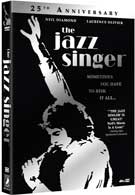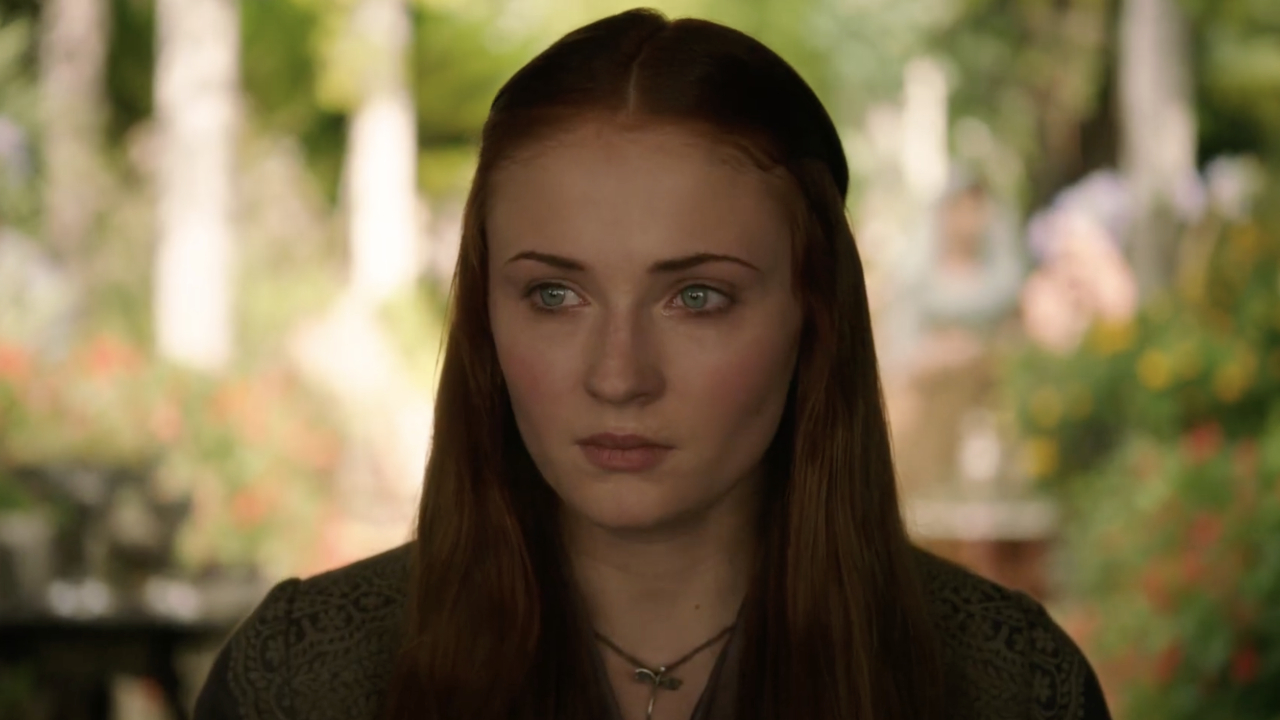Centering a movie around a musical star can be a risky proposition. On one hand, the two can work together beautifully, creating a surprisingly touching story like 8-Mile. On the other hand you can just fill the film with fluff and end up with Spice World. Given how undefinable Neil Diamond’s music is, how can one even begin to try and categorize his movie? Whether or not you will like The Jazz Singer will come down to one simple thing: whether or not you like Neil Diamond’s music. If you like the sometimes-pop/sometimes-country style singings of the 70’s legend, then you’ll probably like his movie. After all, the film heavily features him singing songs that made him famous like, “America” and “Love on the Rocks”. If you don’t care for his music, then you’d be best advised to stay far, far away from this flick. The presence of acting legend Sir Laurence Olivier isn’t going to be enough to make you the least bit interested.
A remake of the 1927 Al Jolson classic (if you use the term “remake” loosely), The Jazz Singer is about the son of a Jewish Cantor who chooses to defy the family tradition of becoming a Cantor in favor of a career as a jazz musician... or soft-rock/pop/country musician in this case since, despite the title, there’s no jazz to be found in the film. Diamond plays Jesse Robin/Yussel Rabinovitch, who decides the life of sequin jackets and flamboyantly displayed chest hair beats the yamukah any day. Laurence Olivier plays his father. The two frequently fight while Jesse tries to figure out what to do with his life and sings a lot.
Although the jazz music, including Jolson’s famous “Toot Toot Tootsie” no longer exist in this remake, there are some holdovers from the classic movie. Most surprisingly of these is the decision to have Diamond in black face for a scene where his character performs in a “black club” only to be mobbed (by a young Ernie Hudson) when it’s discovered that he is white. It’s kind of hard to imagine that kind of scene done today, let alone in a movie starring someone with the prestige of Olivier.
It should be noted, however, that the only excuse for Olivier’s role in the movie is that the film came late in his career, when he was pretty much just acting for cash (by his own admission). Still, he puts in an interesting, if not oddly compelling performance as the Cantor who only wants his son to follow in the family tradition. I know people who are as narrow-minded as Olivier’s character, so while the character may seem at times a bit over the top, I see parts of people I know in the role.
There is, maybe, thirty minutes worth of story in this two-hour film. Jesse argues with his father, goes to L.A. abandoning his wife and dad, meets a new love interest, hitchhikes around when he can’t take the pressures of the conflict between his desire and tradition, and then meets back up with his father in time for Yom Kippur (The Day of Atonement). It’s an overly simple story which provides little challenge for a rookie actor like Diamond. Despite its simplicity, there is cringe worthy dialog poorly delivered by the amateur actor, which earned Diamond the first ever “Razzie” award when the film first hit theaters.
So if there’s only thirty minutes of story in the film, basic math should tell you there’s ninety more minutes to fill. Enter Neil Diamond’s repertoire. It feels like every five minutes Diamond is breaking into song, either as part of the film or to aid a montage sequence. Of course, there are only so many songs to go around, so we are treated to two performances of “America” (which bookend the film) and two or three performances of “Love on the Rocks” and “Hello Again”. Sadly, what could be emotionally riveting songs are killed because the story of The Jazz Singer is pretty lame. Which leads me back to my original statement: if you like Diamond’s music, you’ll probably like the film, since it dominates the picture. If you don’t want to hear the tunes, avoid the film. If the movie’s value is based on whether or not you like Neil Diamond, then the DVD release of The Jazz Singer is based completely and totally on whether you already like the movie. This is not a DVD I would recommend just anyone picking up to determine whether they like the movie and, in fact, if you haven’t already seen The Jazz Singer I would suggest not checking it out on this “25th Anniversary” edition DVD.
Why? Because the DVD looks horrible. The picture has not been noticeably repaired from time’s effects and is therefore grainy and poor through a large amount of the film. I can’t remember one standout moment where the picture has that clarity and quality that DVDs should have. The sound on the other hand is fantastic, which I guess is a good thing since the bulk of the movie is made up of Diamond’s singing. At least you can hear things well enough, but there really should have been some improvements made to the picture before this was released on DVD.
Your Daily Blend of Entertainment News
For a silver anniversary edition, this DVD is lacking in the area of bonus material. There are in-depth text biographies of Diamond, Olivier, and director Richard Fleischer, some advertising spots including the theatrical trailer, and a commentary track. That’s not a whole lot for such a prestigious anniversary and what’s specifically interesting is that Diamond, who made his acting debut with the film and hasn’t really done much since, is nowhere to be found in the production of the DVD. Maybe the critical shredding he got when the movie came out was just too much for the man, but other then his biography, there’s nothing about Diamond on this DVD. Fleischer doesn’t show up either, making this a DVD that has none of the creative team remembering what it was like to make the movie.
Instead, in the absence of the creative team, we get a commentary by Jerry Leider, the producer of the movie. Typically producers foot the bill for the film, securing finances and that sort of thing, but they aren’t usually involved in the creative side of things. Leider’s commentary sounds like someone who has never done a commentary before, as well as someone who hasn’t seen this movie since its debut in theaters. Instead of offering stories reminiscing about things, Leider just points stuff out and talks about a few tidbits he had forgotten over the years. It’s not a fascinating commentary, or really even an interesting one. However, it’s really the only bonus material this disc has, take it or leave it.
The Jazz Singer is the type of movie that’s only going to appeal to a select audience, and as such it hasn’t really received the best of treatment on DVD. Unless you’re a hardcore Neil Diamond fan, you probably will want to pass this flick by, especially given its poor presentation. Hopefully the 50th anniversary will see a better treatment, and we can say “Hello Again” to Diamond and company with something better then this lackluster disc.

